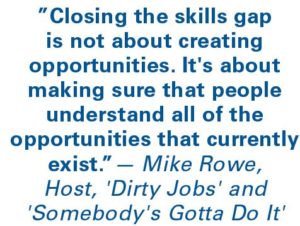Work Hard and Work Smart
September 21, 2015By Dawson Bell
Mike Rowe redefines how Americans view skilled trades
Mike Rowe is familiar to most Americans as the longtime host of “Dirty Jobs” on the Discovery Channel and, more recently, “Somebody’s Gotta Do It” on CNN. These shows take you inside the livelihoods of people who make the world work.
But he stopped thinking of himself as a TV host more than a decade ago when he realized the people who perform the sometimes dangerous and unglamorous, yet fascinating and necessary jobs he was bringing to the screen didn’t need a celebrity; they needed help.
From that point on – as he told a Detroit Regional Chamber Mackinac Policy Conference audience earlier this year that the revelation came while he was filming a segment in an underground sewer in San Francisco – Rowe has become something of a professional apprentice, illuminating interesting work by doing it. He’s also become one of the country’s leading evangelists for the virtues of work that require neither a college degree nor a mountain of debt to attain.
That passion was on display at the Conference, where Rowe and Gov. Rick Snyder announced a new campaign to promote the skilled trades, which includes a half dozen videos featuring Rowe. The videos are designed for Michigan’s middle and high school students and focus on career opportunities in technical fields ranging from health care to welding.
From his first days in office, Snyder has often cited the need for more technical and vocational training for the Michigan workforce, but 53-year-old Rowe is characteristically blunt about what he sees as a disconnect between the aspirations and abilities of many young people and the message contemporary society sends about the road to success. Sometime in the post-war period in America it became accepted wisdom that the way – almost the only way – to secure a satisfying and prosperous future was by graduating from a four-year college, he said. And for many, he added, that may be true.
In contrast, he said, is the world he discovered while working his way across the country for “Dirty Jobs.” “Everywhere I went … there were “help wanted” signs,” he added.
 As Rowe sees it, there are hundreds of occupations that don’t require a four-year degree, but do provide interesting, satisfying and well-compensated ways to make a living. Many of them make the lives of other people better or produce a tangible product that fulfills a real human need. Almost all, in Rowe’s view, deliver the intrinsic satisfaction that comes from working hard to get something that needs doing done.
As Rowe sees it, there are hundreds of occupations that don’t require a four-year degree, but do provide interesting, satisfying and well-compensated ways to make a living. Many of them make the lives of other people better or produce a tangible product that fulfills a real human need. Almost all, in Rowe’s view, deliver the intrinsic satisfaction that comes from working hard to get something that needs doing done.
And there’s certainly nothing mindless about skilled work. Rowe remembers, and decries, a poster that appeared in American schools, including his own in Baltimore, in the 1960s and ’70s: “Work smart, not hard,” it said above photos of a college student and a manual laborer. Rowe said even as an adolescent, the poster struck him as discordant. He was preparing to go to college – and eventually earned a degree in communications at Towson University – but the notion of a dichotomy between smart work and hard work showed a lack of appreciation for the value of the latter.
Rowe’s own grandfather had little formal education. He made his living as a pipe-fitter, electrician, mechanic and jack-of-all-trades. He “could fix anything” and “built a house without blueprints,” Rowe said.
As an adult television presenter, Rowe often thought about his grandfather and said that it would be “nice to do a show that looked like (that kind of) work.” He knew from his grandfather’s example that working hard didn’t mean mindless work, and he came to believe that the “Work smart, not hard” promotion for college education was the “single, worst piece of advice the country ever got,” he added.
In his contemporary role as an advocate for skilled work, Rowe produced a new poster: “Work smart, and hard.” That’s the message he’s spreading with his television work, a foundation he established called mikeroweWORKS and the joint initiative between the Michigan Economic Development Corporation and Michigan’s Talent Investment Agency.
Rowe wants to redefine the definition of what constitutes a good job. Doing so, he believes, will require a serious marketing campaign – one that takes on the stereotypes that relegate skilled, necessary and important work to second-class status, one that reaches young people, and one that serves both the interest of aspiring workers and the employers who need them.
“Closing the skills gap is not about creating opportunities,” Rowe said. “It’s about making sure that people understand all of the opportunities that currently exist.”
Visit Mike Rowe’s skilled trades promotion website at profoundlydisconnected.com.
View his Michigan videos at mitalent.org.
